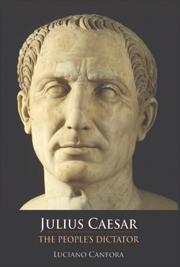Book contents
- Frontmatter
- Contents
- Translators' Note
- Acknowledgements
- Foreword
- PART I FROM SULLA TO CATILINE
- PART II FROM THE TRIUMVIRATE TO THE CONQUEST OF GAUL
- PART III THE LONG CIVIL WAR
- PART IV FROM THE CONSPIRACY TO THE TRIUMPH OF CAESARISM
- 29 Inklings of Conspiracy
- 30 ‘Iure caesus’
- 31 The Lupercalia Drama
- 32 The Dictatorship
- 33 Epicureans in Revolt?
- 34 The Hetairia of Cassius and the Recruitment of Brutus
- 35 A Conspirator's Realism: Cassius Settles for the Second Rank
- 36 Some Unexpected Refusals
- 37 Cicero – an Organiser of the Conspiracy?
- 38 The Serious Mistake of Dismissing the Escort
- 39 The Dynamics of the ‘Tyrannicide’
- 40 ‘Where's Antony?’
- 41 Caesar's Body: How to Turn Victory into Defeat
- 42 The Wind
- Chronology
- Bibliography
- Index
34 - The Hetairia of Cassius and the Recruitment of Brutus
from PART IV - FROM THE CONSPIRACY TO THE TRIUMPH OF CAESARISM
Published online by Cambridge University Press: 05 August 2013
- Frontmatter
- Contents
- Translators' Note
- Acknowledgements
- Foreword
- PART I FROM SULLA TO CATILINE
- PART II FROM THE TRIUMVIRATE TO THE CONQUEST OF GAUL
- PART III THE LONG CIVIL WAR
- PART IV FROM THE CONSPIRACY TO THE TRIUMPH OF CAESARISM
- 29 Inklings of Conspiracy
- 30 ‘Iure caesus’
- 31 The Lupercalia Drama
- 32 The Dictatorship
- 33 Epicureans in Revolt?
- 34 The Hetairia of Cassius and the Recruitment of Brutus
- 35 A Conspirator's Realism: Cassius Settles for the Second Rank
- 36 Some Unexpected Refusals
- 37 Cicero – an Organiser of the Conspiracy?
- 38 The Serious Mistake of Dismissing the Escort
- 39 The Dynamics of the ‘Tyrannicide’
- 40 ‘Where's Antony?’
- 41 Caesar's Body: How to Turn Victory into Defeat
- 42 The Wind
- Chronology
- Bibliography
- Index
Summary
There is a tradition that pays particular attention to the role of Cassius in the events leading to Caesar's murder. It emerges here and there in the sources and may well provide a valuable element of information. The clearest text is also the most interesting: Plutarch's account of the coup at the beginning of his Life of Brutus, which uses sources very close to the events and the protagonist. He relies on Brutus by Emphylos, the Rhodian rhetorician who remained Brutus' friend and confidant to the very end, as well as the biography written by Brutus' stepson, Marcus Calpurnius Bibulus, the son of the first marriage of Porcia (Brutus' wife and Cato's daughter) to Bibulus, Caesar's colleague in the consulate of 59 bc. These are primary sources of the first rank, and the whole of Plutarch's account bespeaks a view favourable to Brutus, which derives from Plutarch's own intellectual sympathies as well as from those sources.
Describing the beginning of the conspiracy, Plutarch tells how Brutus was gradually won over by Cassius to the idea of eliminating the ‘tyrant’ by assassination, despite the very high favour he enjoyed with Caesar. Here Plutarch uses a particularly significant expression: ‘Indeed, had he wished it, he might have been first among Caesar's friends and exercised the greatest power; but the party (hetairia) of Cassius drew him away from such a course.’ In the rest of his account Plutarch clearly describes the further efforts of ‘Cassius’ hetairia' to draw Brutus in.
- Type
- Chapter
- Information
- Julius CaesarThe People's Dictator, pp. 306 - 310Publisher: Edinburgh University PressPrint publication year: 2007



